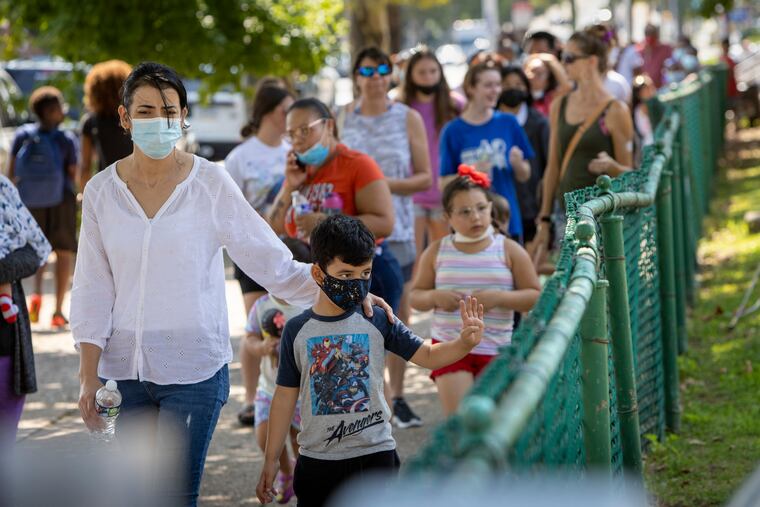Philly schools’ quarantine protocols maximize student absence | Opinion
After initially supporting "test-to-stay" policies for Philly schools, the Philadelphia Department of Public Health has reversed course.

When Philadelphia announced plans to reopen public schools for full-time in-person classes, we were relieved.
We watched only the public schools remain closed last year despite ample evidence of safety with basic mitigations. We watched our kids spend their days staring at a computer screen isolated from teachers and classmates. Complaints about headaches and technical difficulties were frequent; more concerning were the anxiety and depression afflicting them. We were fortunate to send our kids back twice a week late in the spring. The joy on their faces was palpable, the improvement in their mental health obvious.
We were grateful that the Department of Public Health initially aligned to CDC school reopening guidance by requiring masks. It responded to evolving evidence by instituting a “test-to-stay” policy, meaning those in close contact with a COVID case do not automatically quarantine. Instead, they are tested frequently within the first seven days after exposure. Those who are asymptomatic and test negative remain in school.
» READ MORE: Vaccines now mandatory for 20,000 Philly school district staff
Test-to-stay is supported by results from a randomized trial conducted by the University of Oxford during the U.K. delta wave. The United Kingdom had a less comprehensive mitigation strategy; neither masks for children under 12 nor routine asymptomatic testing were mandated.
The results of this study are important for two reasons, and we hope they shape Philly’s policy moving forward.
First, the rate of positive COVID-19 cases among exposed students and staff remained very low, under 2%, even during a delta wave. This is reassuring and confirms data generated closer to home — a study conducted within New York City public schools found only 0.5% of the 36,423 close contacts quarantined subsequently tested positive.
Second, daily testing was as successful as a forced quarantine in identifying positive cases, meaning the majority of close contacts can remain safely at school.
Based on these results, we are now flummoxed to see the Philadelphia health department execute a complete reversal and require any unvaccinated close contact — masked or not — to quarantine for a minimum of seven days (if you test negative on day 5) or 10 days (if you chose not to test). This is contrary to CDC guidance, in which definition of a close contact excludes students when the infected person and student are both wearing masks (properly).
By ignoring evolving evidence and CDC recommendations, the health department has authored a plan that maximizes student absence and further disrupts education. When queried via email, the department has not provided any evidence for its decision.
Public health requires taking a 360-degree lens to a problem and seeks minimal disruption to life while preserving safety.
Quarantines were initially necessary when tools were not readily available to identify who is infectious and who is not, and when knowledge regarding risk was less known.
However, we are now at a different stage of the pandemic and with additional tools at our disposal. Safe and effective vaccines are widely available for ages 12 and older. Lateral flow tests can speed PCR results. Rapid antigen tests return a reliable result for positives in 15 minutes. Our quarantine plans for close contacts in schools likewise need to evolve.
COVID-19 is not the only risk our kids face. We’d be foolish to believe all kids will be able to quarantine at home for 10 days. It’s more likely they’ll be in other, less safe environments. Families may also be less likely to either test their child or report a positive result in hopes of keeping their child in school. This could increase risk of in-school COVID transmissions.
Following science means continually moving as data evolve. But science has evolved with better testing, vaccines, and a more robust body of well-generated evidence in comparable situations. Simply said, we know more now than we did in March of 2020.
» READ MORE: A year into PHLConnectED, Philly has made 18,000 internet connections
The health department should be charged with generating a plan consistent with CDC guidance that maximizes, rather than jeopardizes, in-person learning days without sacrificing the ability for meaningful infection control.
Implementing a plan that is inconsistent with public health principles, one that risks maximal disruption without acknowledging those costs, rationalized by suggesting “maybe it’s safer” without acknowledging the evidence suggests it is not actually safer — shouldn’t be an option. Our kids deserve better. They deserve to have their education prioritized. Every possible kid should be able to attend school every possible day.
Priscilla Lo and Dr. Jessica Ackert are parents of rising sixth graders in the Philadelphia School District and have been advocating for the full reopening of public schools in Philadelphia.